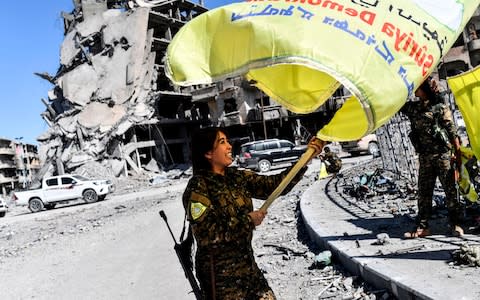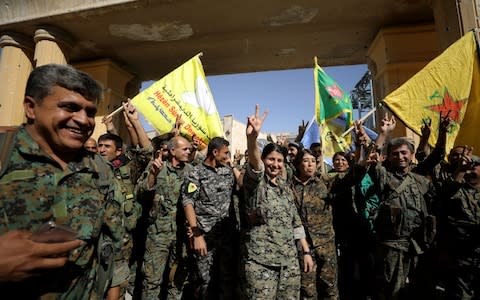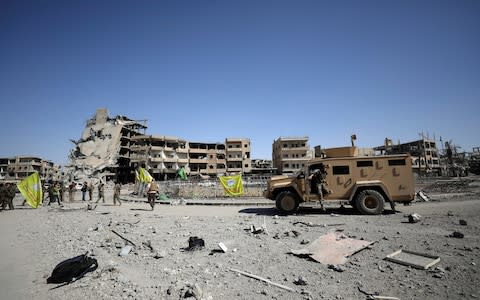Defeated Isil 'cowards' take the bus home as Raqqa, capital of terrorism, is defeated at last

The Islamic State’s “capital” fell on Tuesday after US-backed forces declared victory in the Syrian city where the jihadist group plotted attacks on the West.
Brig Gen Talal Silo, the spokesman for the US-backed Syrian Democratic Forces, said that clashes with Islamic State of Iraq and the Levant (Isil) fighters in Raqqa had stopped, ending their three-year reign of terror in the city.
“The SDF is now in control of the former capital of terrorism," Mr Sllo told the Daily Telegraph. “A formal declaration will be made from the city soon, after the clearing operations end. Raqqa is still full of landmines.”
The fighters limped out from their final redoubt in Raqqa’s central hospital on Tuesday and onto waiting buses.

Having promised to fight to the death for the capital of their so-called caliphate, in the end Islamic State's jihadists surrendered after realising they had been cornered.
“Cowards to the end,” said Macer Gifford, the pseudonym of a Briton fighting alongside the US-backed Syrian Democratic Forces in Raqqa. He has been battling Islamic State of Iraq and the Levant (Isil) militants in the city since the start of the offensive in June and was there to watch some of the last of them flee.
“It was difficult to see them so close and to just watch them leave,” the former currency trader from Oxford told the Telegraph.
ISIS leaving Raqqa hospital. Cowards until the end... pic.twitter.com/sE6K3nPgHh
— Macer Gifford (@macergifford) October 17, 2017
After a devastating four-month battle, the remaining 200-odd fighters gave up their fight and agreed to an evacuation deal which saw them bused out of the city to the last-remaining slivers of territory still under the jihadists’s control to the south.
The final black flag was taken down from the city’s stadium, which had been used as a prison during Isil's brutal three-year rule and had become synonymous with the group’s violent excesses. Photos showed Kurdish female fighters of the SDF waving their own yellow flag in its place.

All that was left to do was check the many tunnels Isil had dug for sleeper cells and IEDs, Talal Silo, the SDF"s spokesman, said.
“A formal declaration will be made from the city soon, after the clearing operations end. Raqqa is still full of landmines,” Mr Silo told the Daily Telegraph. “But the SDF is now in control of the former capital of terrorism."
During the campaign for Raqqa the city suffered massive devastation from Isil's mines as well as from US-led coalition air strikes which left most of its buildings levelled and in ruins.
The Britain-based Syrian Observatory for Human Rights monitor put the overall death toll for the battle at 3,250, including fighters and civilians, but said hundreds were still missing or unaccounted for. Five British volunteers were also killed.
Isil’s use of civilians as human shields forced the coalition to rely on coordinated air strikes, at a heavy cost.

“They never fought us face-to-face like men,” Mr Gifford, who uses a pseudonym, told the Telegraph by phone. “They would just shoot at us from sniper positions and drive at us with car bombs.
“They surrounded themselves with women and children, which they used as protection against the strikes.”
An international charity group says tens of thousands of people who did manage to flee are now in desperate need of aid and that the nearby camps are "bursting at the seams."
With the high levels of destruction reported in and around the city, most families have nowhere to return home and are likely to stay in camps for months or years to come.
The militants seized the city in early 2014 in a blitzkrieg offensive across Syria and neighbouring Iraq, making it the headquarters of its self-styled "caliphate".
At one point they controlled approximately a third of Syria and a third of Iraq, making up a quasi-state the size of Britain.
So confident was the group during its height they threatened to conquer Rome.
Col. Ryan Dillon, spokesman for the anti-Isil coalition, said on Tuesday the fall of Raqqa would deny Isil the "well spring" that provided planning and support for terror operations in Syria and around the world. The effect the loss of the city, which had become the administrative heart of the Islamic State, will have on the group cannot be underestimated.
It was from Raqqa its miliants filmed their slickly produced and often gory propaganda videos which lured thousands of recruits from around the world to join them.
They plotted the most devastating attacks on Europe from the city’s internet cafes.
It was from the hills outside Raqqa Briton Mohammed Emwazi, otherwise known as Jihadi John, executed two of his countrymen in videos which shocked the world in 2014.
The jihadists would continue to rule over the city’s residents with an ultra-conservative and brutal interpretation of Sharia law for another three years.
Schools were closed and children were sent to mosques for indoctrination into jihad and camps for military training. Adults were stoned to death and beheaded for infractions as minor as smoking or listening to music.
But the group's fortunes changed dramatically after Iraqi forces began their offensive to retake its most prized territory of Mosul last year. And in recent months in Syria they have been forced back into a strip of the Euphrates valley and surrounding desert.

Now more than 85 per cent of Isil’s territory in Syria has been liberated and around 90 per cent in Iraq.
But experts say Isil will remain a serious threat for the foreseeable future, despite its significant territorial losses. And that while the battle may be over, the war is yet to be won.
“Today marks the end of Caliphate ISIS, but the beginning of Insurgency ISIS,” said Hassan Hassan, a resident fellow at the Tahrir Institute for Middle East Policy and co-author of ISIS: Inside the Army of Terror.
Charlie Winter, a senior research fellow at the International Centre for the Study of Radicalisation and Political Violence, warned that its ideology would linger long after its "caliphate" was gone.
"I don't think it's simply a question of taking away the Islamic State's territory and the Islamic State's idea disappears," he said.
He said the group saw itself as successful, having "managed to declare a caliphate and keep it going" - something unprecedented in modern jihadism.
Additional reporting by Luna Safwan in Beirut

 Yahoo News
Yahoo News 